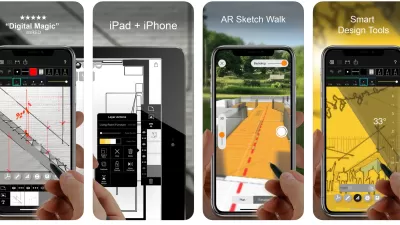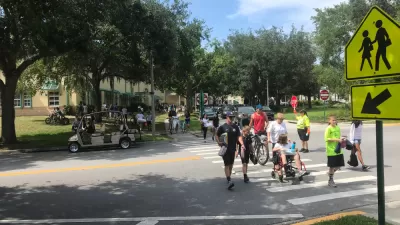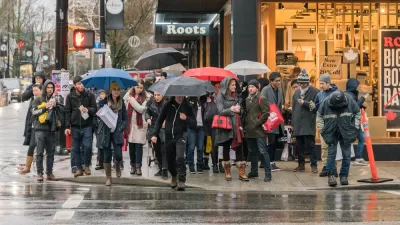Bill Lindeke examines a few examples of mobile technology that encourage citizens to ditch their cars and walk. Could these technologies inspire the cultural side of the equation needed for widespread adoption of walkability?
Bill Lindeke surveys examples of mobile technology that encourages people to get out and walk, starting first with the Fitbit, which he describes as the "a small pedometer linked to a smartphone that provides feedback about how people get around." Like the role Strava plays for bikers, Fitbit provides instant feedback that can also be shared with friends and weighed against established goals and the activities of others.
Lindeke also cites another interactive, if more idiosyncratic example, of a mobile game called Ingress, which is a spatial, interactive game supported by Google.
In the game, two teams of people fight for control over the landscape by moving between different public spaces in the city. (The game’s “portals” often include churches, murals, sculptures, parks or even little free libraries.) Because playing the game requires you to physically visit each site, players must continually walk, bike or take the bus around the city.
Lindeke concludes the article by acknowledging that apps such as these that motivate people to walk are only part of the equation necessary to succeed in building a more pedestrian-oriented society.
FULL STORY: Smartphone apps can't change the landscape, but they do encourage walking

Maui's Vacation Rental Debate Turns Ugly
Verbal attacks, misinformation campaigns and fistfights plague a high-stakes debate to convert thousands of vacation rentals into long-term housing.

Planetizen Federal Action Tracker
A weekly monitor of how Trump’s orders and actions are impacting planners and planning in America.

In Urban Planning, AI Prompting Could be the New Design Thinking
Creativity has long been key to great urban design. What if we see AI as our new creative partner?

King County Supportive Housing Program Offers Hope for Unhoused Residents
The county is taking a ‘Housing First’ approach that prioritizes getting people into housing, then offering wraparound supportive services.

Researchers Use AI to Get Clearer Picture of US Housing
Analysts are using artificial intelligence to supercharge their research by allowing them to comb through data faster. Though these AI tools can be error prone, they save time and housing researchers are optimistic about the future.

Making Shared Micromobility More Inclusive
Cities and shared mobility system operators can do more to include people with disabilities in planning and operations, per a new report.
Urban Design for Planners 1: Software Tools
This six-course series explores essential urban design concepts using open source software and equips planners with the tools they need to participate fully in the urban design process.
Planning for Universal Design
Learn the tools for implementing Universal Design in planning regulations.
planning NEXT
Appalachian Highlands Housing Partners
Mpact (founded as Rail~Volution)
City of Camden Redevelopment Agency
City of Astoria
City of Portland
City of Laramie





























